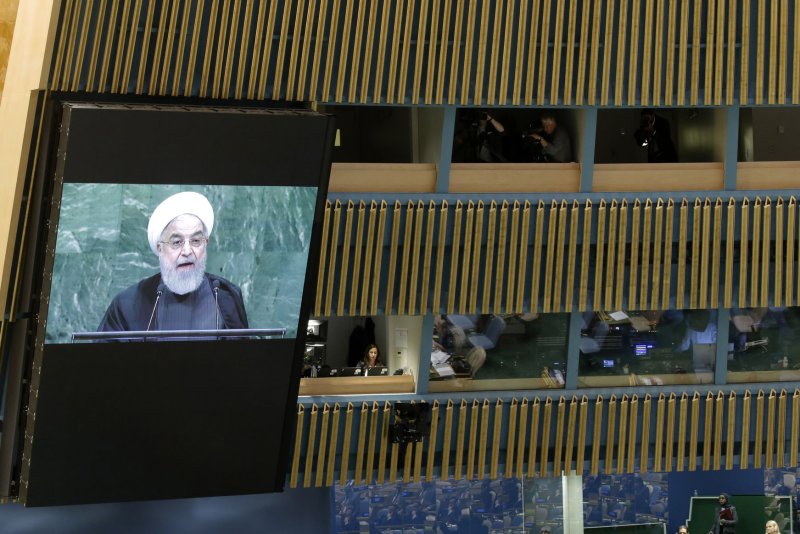Iranian President Hassan Rouhani speaks at the 73rd session of the United Nations General Assembly at U.N. headquarters in New York City on September 25. Photo by John Angelillo/UPI |
License Photo
Oct. 3 (UPI) -- The United States withdrew from the 1955 Treaty of Amity which normalized relations with Iran, Secretary of State Mike Pompeo announced Monday.
The move came after the International Court of Justice ordered Washington to ease sanctions on Iran so that humanitarian goods can enter the country again.
"I'm announcing that the United States is terminating the 1955 Treaty of Amity with Iran," Pompeo said during a briefing announcing the termination of the agreement. "This is a decision frankly that is 39 years overdue."
The Netherlands-based court ruled that necessary medicines, medical supplies, food and agricultural products should be allowed into Iran. Earlier this year, the United States imposed sanctions to compel Iran to agree to a new nuclear deal.
"The court considers that the United States must remove, by means of its choosing, any impediment ... to the free exportation to the territory of Iran of goods required for humanitarian aid," said ICJ justice Abdulqawi Yusuf.
This sets up another showdown between the ICJ and the U.S. administration, which has already said the court has no jurisdiction over its foreign policy, especially concerning national security. The court is the primary judicial arm of the United Nations.
Wednesday's decision marks the first time the ICJ, also known as the world court, has intervened on sanctions against another country.
The court said in its 29-page ruling the U.S. sanctions violate the Treaty of Amity, which was established a quarter-century before Iran's Islamic revolution in 1979.
"The decision proved once again that the Islamic Republic is right and the U.S. sanctions against people and citizens of our country are illegal and cruel," Iran's foreign ministry answered in a statement.
In his speech before the United Nations General Assembly last week, President Donald Trump called on all countries to isolate Iran and stop the flow of money to the regime of President Hassan Rouhani.
The sanctions have caused Iran's economy and currency to decline sharply, and a new round of penalties to limit oil exports take effect in November. Countries will be prohibited from buying Iranian crude oil exports.
The court's decision is binding, but it has no power to enforce it. The United States left the International Court of Justice more than a decade ago.
"I am not quite sure that the Trump administration will change anything on their policy towards Iran because of this decision ... They will not recognize the jurisdiction of the ICJ on U.S. foreign policy," said Luciano Zaccara, a researcher specializing in Iranian politics at Qatar University.















